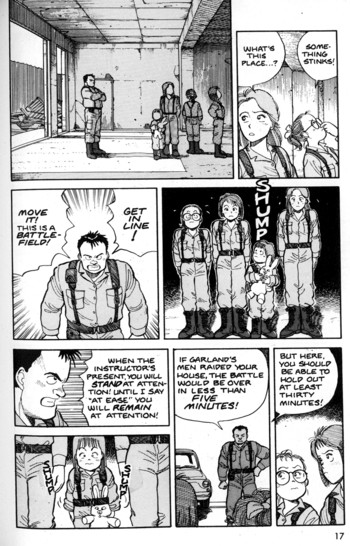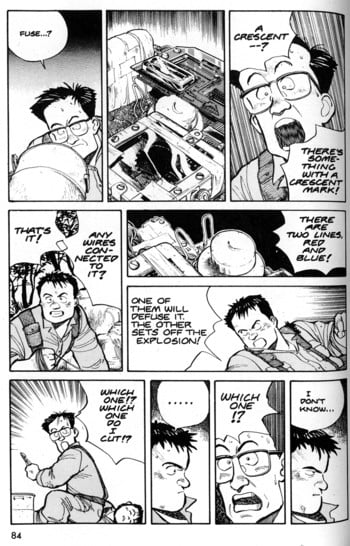Jason Thompson's House of 1000 Manga - Pineapple Army
by Jason Thompson,
Episode CI: Pineapple Army
"A man who's lived on a battlefield cannot die anywhere else…He moves from one battlefield to another…war to war…He starts to believe he exists only in combat…That it's the only time he's alive…"

Once upon a time even Naoki Urasawawas a beginner. Born in 1960, Urasawa debuted as a professional mangaka at age 23, when the market for seinen (men's) manga was booming. But before he became known as the creator of megahit seinen story manga like Monster and 20th Century Boys, he drew stories for other authors. One series was the 1988 detective manga (okay, insurance investigator manga) Master Keaton, written by Hokusei Katsushika. Another was the 1985 manga Pineapple Army, written by Kazuya Kudō, Urasawa's first manga ever translated into English.
Jed Goshi—Lieutenant Jed Goshi—is a Japanese-American war veteran. Trained by deadly combat in Vietnam, like John Rambo or that Banana Fish guy, he's left the war behind and he's trying to live in peace in his simple apartment in New York. He's a nice guy who spends his spare time exercising and repairing furniture. But this DIY dude still has to make a living, and so he makes it by training other people how to fight.
"I'm not a mercenary or a professional assassin…I'm not a bodyguard. I'm an instructor. I turn people into combat-ready soldiers in a short amount of time. Understand?" Jed's skills are considerable, so he doesn't lack for business. One fellow soldier estimates that he's one of the top three fighters in the world. His favorite weapons are pineapple grenades, hence the title. He trains anybody: Bengali militiamen, American soldiers, whoever. But he's got a soft spot for the underdog, and his favorite jobs seem to be training people who have zero combat experience and zero chances: a bullied Cuban street kid, a rich heiress, a cowardly Japanese-American salaryman, or, in the first story, a group of four cute little girls whose father was a NYPD officer. (If that story had been done today, I can easily see it being a moe thing.) Like the world's greatest Crossfit instructor, Goshi pushes his students hard and teaches them to kick ass, until even the four little girls are able to wield machine guns and fight off the mafia crooks come to steal their dead father's fortune!! ("You're holding a CZ61, made in Czechoslovakia. It's the only sub-machine gun small enough for you to handle.") Goshi doesn't save you from the bad guys, he teaches YOU to save yourself…although when the chips are down and you need that extra bit of help, he may mysteriously show up and save you anyway.

Pineapple Army was written by Kazuya Kudō (1941-), an oldtime manga author who also worked on Golgo 13 (he wrote the "Argentine Tiger" story which Viz translated in the early '90s). The Golgo similarity is obvious: like Golgo 13, Pineapple Army is mostly a bunch of stand-alone stories, each involving some different crime or mercenary mission, and mostly based on current events. Goshi faces Russian spies, Arab and Hindi bad guys, Sandinistas and Contras. He breaks his own rules a little and actually does travel to other countries to do merc work, getting into a rumble in the jungle in Latin America with a suspiciously Austrian-looking dude in one chapter. (What kind of '80s manga would it be without an Arnold Schwarznegger look-alike?) Gradually, we learn more about Goshi's backstory: after the Vietnam War, he traveled around the world as a mercenary, going places like Zaire, where he trained anti-government militias. In real life, if he lived today, he'd probably be an Iraq war vet and work for Blackwater. Except that Jed is just so darn moral, he disobeys orders and goes rogue rather than work for evil, military-industrial-complex jerks ("If we don't start a war, how can we make any money?").
But the traveling-mercenary stories are a little generic, like Golgo without the "…" or Spriggan without the cool science-fiction stuff; most of Goshi's best stories take place at home, in New York. To Japanese manga readers in the '80s, New York was the wild frontier, a land of corruption & violence & guns & blondes. America is a place so dangerous that you need a guy like Jed Goshi to train you; if this seems slightly inaccurate, well, it's no more inaccurate than the scene set in 1985 when Jed takes his date to a disco. o_0
1985 was just ten years after the end of the Vietnam War, more recent than the start of Afghanistan War today, and Vietnam features heavily in this story. ("170,000 marines returned alive from Vietnam. An estimated 40,000 of them live in New York City. Most are still affected by war in one form or another.") If Goshi is a superhero, Vietnam is the radioactive spider that gave him superpowers. Many of the stories, in fact, involve Goshi fighting fellow Vietnam vets who have gone evil as a result of their experiences. One is Robert Carey, the 'subway commando', who leads a corrupt groups of so-called vigilantes probably based loosely on the Guardian Angels. Another is a mad explosives expert. There's even a crazed World War II vet, still killing people after all these years. For Goshi, the war made him a man; for other people, it screwed them up bad. Obviously the "crazed war vet" story is, sadly, as current as ever.
In Japan, Pineapple Army ran for eight volumes and was a modest success. (There's a reference to it in Hellsing.) It led the way to Urasawa's future hit manga, like Yawara! A Fashionable Judo Girl, a sports manga that ran from 1989 to 1993 and was made into a live action movie and an anime. Viz hoped that they could replicate Urasawa's success in the US, but the manga market in 1990 (like today, sadly) was too shaky to support a 29-volume series. As a representative of Urasawa's work, they chose Pineapple Army, which was self-contained and had a military-action theme that was safer than sports in the American comics market. (Also, Mai the Psychic Girl, written by Kazuya Kudō with art by Ryōichi Ikegami, had been a hit.) The Viz edition also featured original, Dave McKean-style covers by an artist whose name I unfortunately can't remember, to make Pineapple Army look cooler. What did readers think when they bought the manga for those intense, serious covers and then found a story about a little girl with a bunny rabbit lobbing hand grenades at goons in sunglasses? Pineapple Army wasn't a success in the US, and it hit the dust after a few issues, although it was later collected in a graphic novel which is still available cheap on used-book sites. The Viz graphic novel edition also includes an afterword by James Hudnall, one of Viz's most prolific manga rewriters, who talks about his own experiences in the US Air Force.
It's too bad Pineapple Army wasn't a hit and didn't lead to more Urasawa translations in the '90s; but frankly, it's my least favorite of all the translated Urasawa series. Simply put, Urasawa's work isn't at its best yet; he's still good, but his Katsuhiro Ōtomo influence is too obvious, and he hasn't quite broken out into his own style. Also, the each-chapter-is-self-contained thing is another downside; in Golgo 13 the chapters are also self-contained, but they're super-long averaging 100 pages, and in Pineapple Army, each chapter is only 32 pages or so. The result is that everything's pretty rushed, and there's lots of info-dumps and sometimes as many as 12 panels per page. And I wish we found out more about what kind of guy Jed Goshi really is, deep down behind the fact that he's a kickass mercenary and a sucker for little girls with bunnies and kind of oblivious around women. Naoki Urasawa is pretty good at drawing gunfights and New York city streets, but he's better at drawing characters and long twisty narratives. Pineapple Army is a buried treasure for Urasawa fans, but it's afterwards that he REALLY got good, and started to produce really original manga that I can recommend wholeheartedly, without ever mentioning how '80s everything is.
Jason Thompson is the author of Manga: The Complete Guide and King of RPGs, as well as manga editor for Otaku USA magazine.
Banner designed by Lanny Liu.
discuss this in the forum (9 posts) |
this article has been modified since it was originally posted; see change history

